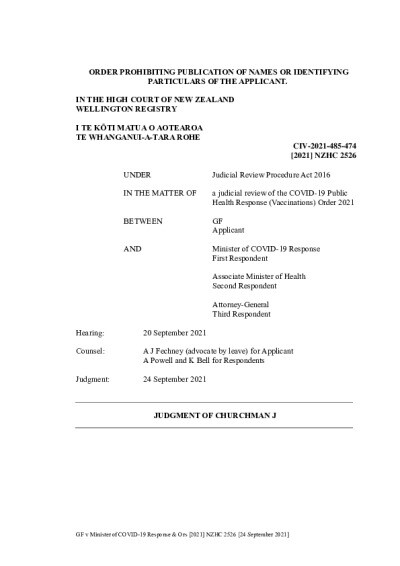
Date
Geographical Area
Pacific
Countries
New Zealand
Keywords
Case Name
GF v Minister of COVID-19 Response & Ors
Case Reference
[2021] NZHC 2526
Name of Court
High Court of New Zealand
Key Facts
In response to the rising number of Covid-19 cases within New Zealand and internationally, an order was issued by the Government which required certain front-line border workers to be vaccinated in order to continue being employed at border facilitates. It was called the Covid-19 Public Health Response Vaccinations Order and came into force on 30 April 2021.
The applicant, GF, had their employment at a border facility terminated as a result of the order as they were unwilling to be vaccinated. GF challenged the termination of their employment in the Employment Relations Authority, claiming their dismissal was unjustified. However, the Authority found that it was justified. GF then sought judicial review of the Vaccinations Order in the High Court, they claimed, amongst other things, that the Vaccinations Order was ultra-vires the COVID-19 Public Health Response Act 2020 as the Minister was unlikely to be satisfied that the Order was a justified limit on rights in the New Zealand Bill of Rights Act 1990 (NZBORA).
The applicant, GF, had their employment at a border facility terminated as a result of the order as they were unwilling to be vaccinated. GF challenged the termination of their employment in the Employment Relations Authority, claiming their dismissal was unjustified. However, the Authority found that it was justified. GF then sought judicial review of the Vaccinations Order in the High Court, they claimed, amongst other things, that the Vaccinations Order was ultra-vires the COVID-19 Public Health Response Act 2020 as the Minister was unlikely to be satisfied that the Order was a justified limit on rights in the New Zealand Bill of Rights Act 1990 (NZBORA).
Decision and Reasoning
Under s.9 of the COVID-19 Public Health Response Act, before authorisation of an Order, the Minister must be satisfied that the Order does not limit or is a justified limit on NZBORA rights. As per the Supreme Court decision of Hansen v R, to be a justified limit on a NZBORA right there must be a sufficiently important objective and the means chosen to achieve the objective is proportionate (so must be rationally connected to the objective, impair the right no more than is reasonably necessary, and the benefits achieved must not be outweighed by the significance of the rights limitation). GF identified three rights: the right to not be subjected to medical experimentation (s.10), the right to refuse to undergo medical treatment (s.11), and the right to be free from discrimination (s.19).
The Court did not agree that the use of the vaccine effectively amounted to requiring that person to participate in medical experimentation, stating that as provisional consent is a valid form of consent and the assessment process could not have been more thorough, it was not possible to categorise the use of the vaccine as being the equivalent of medical experimentation.
In terms of the s.11 and s.19 rights, the Court held that there was a sufficiently important objective (protecting the health of New Zealanders) and the means (the Vaccinations Order) was proportionate in achieving the outcome (to prevent or reduce the risk of Covid-19 spreading). This was because there is evidence that the Pfizer vaccine is effective in reducing the Covid-19 transmission rate, so is rationally connected; vaccinations were significantly more useful to prevent the Covid-19 spread, so the impair was no more than was necessary; and that although requiring workers to be vaccinated might amount to discrimination, the benefits of that requirement outweighs any discrimination.
The Court did not agree that the use of the vaccine effectively amounted to requiring that person to participate in medical experimentation, stating that as provisional consent is a valid form of consent and the assessment process could not have been more thorough, it was not possible to categorise the use of the vaccine as being the equivalent of medical experimentation.
In terms of the s.11 and s.19 rights, the Court held that there was a sufficiently important objective (protecting the health of New Zealanders) and the means (the Vaccinations Order) was proportionate in achieving the outcome (to prevent or reduce the risk of Covid-19 spreading). This was because there is evidence that the Pfizer vaccine is effective in reducing the Covid-19 transmission rate, so is rationally connected; vaccinations were significantly more useful to prevent the Covid-19 spread, so the impair was no more than was necessary; and that although requiring workers to be vaccinated might amount to discrimination, the benefits of that requirement outweighs any discrimination.
Outcome
The Court held that the limitation was proportional and demonstrably justified, so was not ultra vires the empowering Act. Therefore, GF’s application for judicial review failed.
Link
Disclaimer
This case law summary was developed as part of the Disaster Law Database (DISLAW) project, and is not an official record of the case.
Document
Document